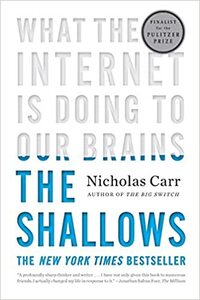You need to sign in or sign up before continuing.
Take a photo of a barcode or cover
hopeful
informative
reflective
medium-paced
I can't believe this book is almost 15 years old. It still packed plenty to terrify me.
This book is pretty amazing. Nicholas Carr takes a subject that is kind of a hot point with a lot of people and goes into the background. He looks at how the brain works. He looks at the history of technology and how it impacts the way the brain works. He looks at how people have declared new technology will be the doom of society from the written word, to printing presses, to radio, to movies, to television and of course to the internet and smart phones.
I love that he does such a good job laying out the science and the facts before he inevitably discusses the actual impact of "what the internet is doing to our brains." I found the book interesting and insightful, but most of all I found it gave me cause to consider my use of the internet, smart phone, e-books and most technology.
Interesting and actionable. Sure, it got a little dry in places, but this is something I'd heartily encourage everyone to read/listen to.
I finished this a while back, but I'm not sure on the date. I was listening to an audio book on this and it was a really hot summer, so I didn't have to mow often, which caused this to take a long time.
I love that he does such a good job laying out the science and the facts before he inevitably discusses the actual impact of "what the internet is doing to our brains." I found the book interesting and insightful, but most of all I found it gave me cause to consider my use of the internet, smart phone, e-books and most technology.
Interesting and actionable. Sure, it got a little dry in places, but this is something I'd heartily encourage everyone to read/listen to.
I finished this a while back, but I'm not sure on the date. I was listening to an audio book on this and it was a really hot summer, so I didn't have to mow often, which caused this to take a long time.
informative
reflective
medium-paced
challenging
informative
inspiring
reflective
slow-paced
Starts off in an interesting history-of-intellectual-technologies path (mostly tracing the history of writing and its evolution into books and then into the Internet). About halfway through, we land in the present, and it becomes repetitive, paranoid, and a little bit grandiose. There are still interesting parts, but the first half is far more enjoyable.
Oops! I forgot to review this one. We read this for book club, and my library was out of physical copies, so I ended up "reading" a book about the differences between reading text in print vs. on the Internet by listening to it on audio. Crazy stuff.
Since book club, I lost my notecard. But I remember being simulataneously frustrated and amazed at all the history Carr includes in the book. The impatient part of me yelled, get to the point! But the inquisitive part of me found it fascinating the comparisons of the Internet -- and how it changes our brain -- to earlier inventions, like the clock and the map. It's mind-boggling to imagine a time when TIME ITSELF was an invention. I can only imagine being, say, 20 and getting my first timepiece, being obsessed with seconds ticking by until I go crazy.
Although I didn't finish listening to the book before it was due back at the library, we talked about close reading a lot in book club. Much of the text vs. internet debate is about the loss of close reading, but in my opinion, close reading, if it ever existed at all, was but a brief moment in overall human history. Carr tells us how reading used to be done OUT LOUD, which kind of make it impossible for close reading, as we define it today. Reading to oneself was at first crazy before it became the norm. And who among us gives the same attention to every word in a sentence. The a's, the the's, the commas and the periods? No one, that's who.
Another interesting fact I recall is how when books were first invented, pornographic stories were almost instantly printed. That's human's for ya. Find a new technology, and get porn on there as fast as possible.
Anyway, Carr writes a thoughtful book that isn't a sensational call to action, but allows its reader to discuss and draw their own conclusions. It provided for a very interesting book club discussion.
Since book club, I lost my notecard. But I remember being simulataneously frustrated and amazed at all the history Carr includes in the book. The impatient part of me yelled, get to the point! But the inquisitive part of me found it fascinating the comparisons of the Internet -- and how it changes our brain -- to earlier inventions, like the clock and the map. It's mind-boggling to imagine a time when TIME ITSELF was an invention. I can only imagine being, say, 20 and getting my first timepiece, being obsessed with seconds ticking by until I go crazy.
Although I didn't finish listening to the book before it was due back at the library, we talked about close reading a lot in book club. Much of the text vs. internet debate is about the loss of close reading, but in my opinion, close reading, if it ever existed at all, was but a brief moment in overall human history. Carr tells us how reading used to be done OUT LOUD, which kind of make it impossible for close reading, as we define it today. Reading to oneself was at first crazy before it became the norm. And who among us gives the same attention to every word in a sentence. The a's, the the's, the commas and the periods? No one, that's who.
Another interesting fact I recall is how when books were first invented, pornographic stories were almost instantly printed. That's human's for ya. Find a new technology, and get porn on there as fast as possible.
Anyway, Carr writes a thoughtful book that isn't a sensational call to action, but allows its reader to discuss and draw their own conclusions. It provided for a very interesting book club discussion.
Op zich vertelt dit boek weinig nieuws (en blijft Nicholas Carr iets te lang op dezelfde nagel kloppen: dit boek kon gerust wat korter). Dat het internet onze aandachtsspanne afzwakt en ons veel ontvankelijker maakt voor afleiding en andere prikkels, is geen grote onthulling: dat merkt elke internetgebruiker zelf wel op. Maar hoe Nicholas Carr dit hier uitdiept, is wel verontrustend: niet alleen onze manier van denken verandert, ook ons brein zelf, fysiek. We hebben niet de controle en niet de keuze: het internet stompt ons af. Al is het plaatje in dit boek wel erg eenzijdig voorgesteld, het klinkt plausibel.
Bijzonder interessant was ook het deel over de evolutie van het schrijven en het lezen (en de boekdrukkunst): hoe stil lezen ons brein veranderde, waarbij we (tegen onze natuur in, want los van prikkels) leerden om lange tijd aandacht te besteden aan een boek of tekst, en dat hierbij de informatie kalm en gestaag ons brein binnendruppelt. Een “aanwinst” die we nu weer aan het afleren zijn.
Ik onthou dat er niet veel te doen valt aan de invloed van het internet op ons brein (terugdraaien heeft geen zin, het internet heeft veel te veel voordelen, en onze maatschappij is inmiddels al veranderd), maar dat het geen kwaad kan om ons hiervan bewust te zijn, om af en toe je eigen brein in te schakelen, op je eigen geheugen te vertrouwen, en om af en toe een boek te lezen.
Aan alle mensen die lachen met mijn papieren zakagendaatje (dat ik met een pen invul!): ik heb vanaf nu een excuus, neh.
In onze - bewust of onbewust - gemaakte keuzes omtrent ons computergebruik, hebben we de intellectuele traditie van afgezonderde, doelgerichte concentratie, de ethiek die het boek ons had geschonken, afgewezen. We hebben ons lot in handen gelegd van de jongleur.
Bijzonder interessant was ook het deel over de evolutie van het schrijven en het lezen (en de boekdrukkunst): hoe stil lezen ons brein veranderde, waarbij we (tegen onze natuur in, want los van prikkels) leerden om lange tijd aandacht te besteden aan een boek of tekst, en dat hierbij de informatie kalm en gestaag ons brein binnendruppelt. Een “aanwinst” die we nu weer aan het afleren zijn.
Ik onthou dat er niet veel te doen valt aan de invloed van het internet op ons brein (terugdraaien heeft geen zin, het internet heeft veel te veel voordelen, en onze maatschappij is inmiddels al veranderd), maar dat het geen kwaad kan om ons hiervan bewust te zijn, om af en toe je eigen brein in te schakelen, op je eigen geheugen te vertrouwen, en om af en toe een boek te lezen.
Aan alle mensen die lachen met mijn papieren zakagendaatje (dat ik met een pen invul!): ik heb vanaf nu een excuus, neh.
In onze - bewust of onbewust - gemaakte keuzes omtrent ons computergebruik, hebben we de intellectuele traditie van afgezonderde, doelgerichte concentratie, de ethiek die het boek ons had geschonken, afgewezen. We hebben ons lot in handen gelegd van de jongleur.
medium-paced
informative
reflective
medium-paced




